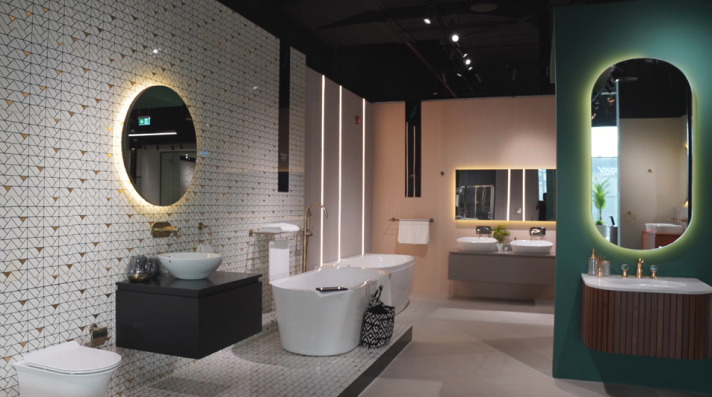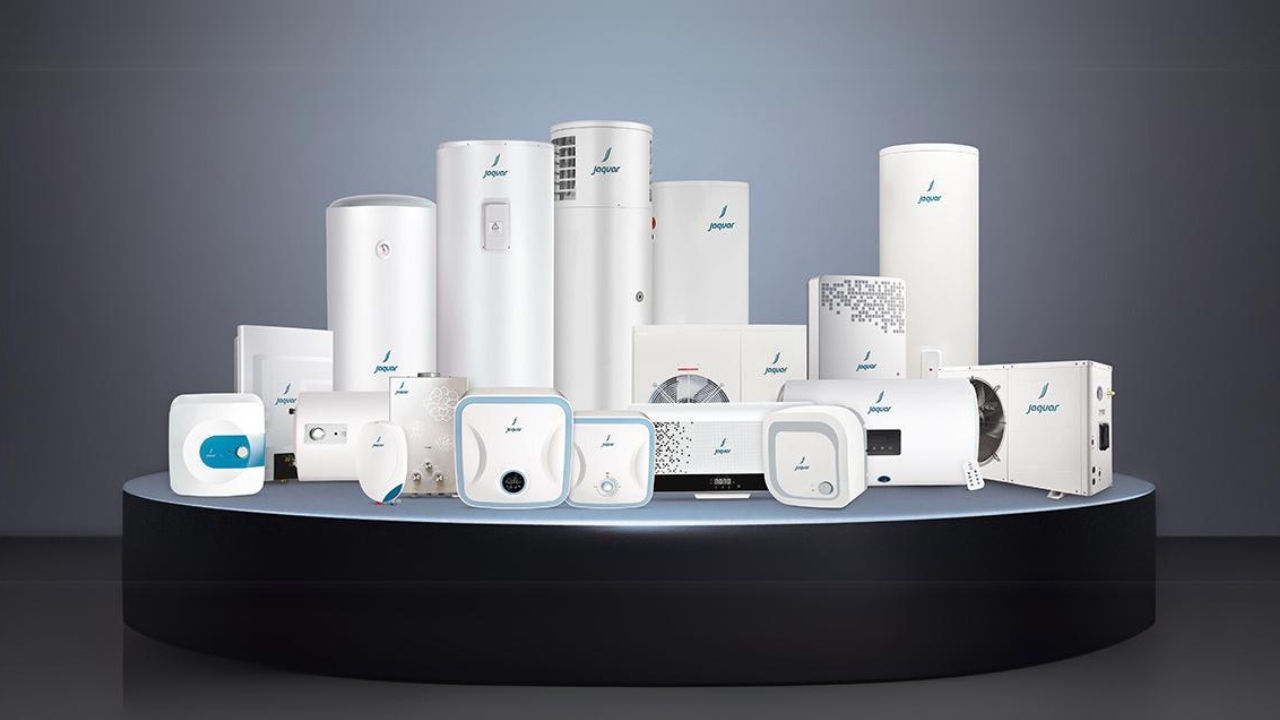Heat pump water heaters are more efficient than traditional electric and gas water geysers. They function as heat transformers, in contrast with conventional water heaters that generate heat by themselves. Consequently, heat pump water heaters require two to three times less energy for their operation compared to ordinary electric-resistance water heaters.
In simple terms, a heat pump uses a little bit of electricity to move heat from one place to another instead of burning fuel in order to generate it directly. For instance, in heat pumps, ambient air is treated as the source of the heat required. Thus, this device extracts warmth from the surrounding air and transfers it into the water tank, where it heats up, thereby heating it.
The way heat pump water heaters work is similar to how your refrigerator or air conditioner works. As an example, just like a fridge extracts heat from its inside and dumps it into the surrounding room, a heat pump extracts any surrounding temperature available and then heats up using this energy. However, unlike the refrigeration process, where there is a cooling effect while moving warmness away from cold areas towards warmer ones, in the case of a heat pump water heater (HPWH), warmth is moved from hotter areas (the ambient) into colder zones (the water tank).
Heat pump water heaters offer all the convenience you are used to with regular water heating systems: hot water on demand. Furthermore, the operating costs of such devices can be extremely low and may comprise only half of what you would have spent on running ordinary electric resistance appliances. As a result, they can reduce your bill for hot water at home by up to sixty percent.
For households that use 41 gallons or more per day with three or more individuals living together, heat pump water heaters could be fitting solutions for them. They can be effective even in cold climates if they are sized properly, but they work best at warm weather stations. Actually, some HPWHs operate well down to about 37 °F.
The heat pump technology for water heating has evolved rapidly in the recent past. Modern-day heat pump water heaters are more reliable, durable, and efficient than their earlier counterparts. These are now a mainstream technology with substantial improvements in efficiency over electric-resistance water heating.
This article will explore some of the latest and greatest technologies in heat pump water heaters that have emerged in the last few years.
What Is a Heat Pump Water Heater, and Where Is It Used?

Credits: Jaquar
A heat pump water heater operates by using electricity to take away warmth from the surrounding air to warm stored water contained inside an insulated tank. Hence, it uses ambient heat instead of generating heat directly, as traditional electrical resistance geysers do.
Heat pump water heaters typically have these main components:
- Compressor: This is the main working component of a heat pump system. The compressor pressurised refrigerant vapour, raising its temperature.
- Condenser: As the hot vapour from the compressor passes through the condenser coils, it condenses into liquid, releasing heat in the process. This heat is absorbed by the water.
- Expansion valve: The liquid refrigerant passes through the expansion valve, causing it to turn back into a cold vapour so it can repeat the cycle.
- Air coils: These coils extract heat from the ambient air, which is then transferred to the refrigerant.
- Storage tank: This is an insulated tank that stores the heated water ready for use.
- Controls: sophisticated controls monitor the system and enable smooth, efficient operation.
Heat pump water heaters, as compared to conventional electric water heaters, can deliver 2-3 times more heat energy per kWh of electricity consumed due to their movement of existing heat as opposed to direct generation. This is because conventional electric water heaters are only about 90% efficient at converting electricity into heat.
This makes them highly energy-efficient. Heat pump water heaters generally have a coefficient of performance (COP) ranging from 2 to 4. In other words, this implies that whenever they consume one kilowatt hour of electricity, they will produce from two to four kilowatt hours worth of heat energy.
In fact, there are some heat pump models with COPs approaching 4, which means that they operate at between 300% and 400% efficiency.
Heat pump water heaters are suitable for most home applications that need a dedicated source of hot water, like:
- Showers
- Baths
- Dishwashing
- Laundry
They can supply adequate hot water for 3–4 bathrooms in warm climates. In colder regions, they may be more suitable for smaller homes.
Heat pump water heaters are commonly used in both residential and commercial buildings, such as:
- Houses
- Apartments
- Condos
- Assisted living facilities
- Hotels
- Restaurants
- Schools
- Government buildings
However, unlike solar water heating systems, heat pump water heaters can still work efficiently in any weather or temperature. Nonetheless, they are most effective in warm and humid areas where there is ample ambient heat available. In colder regions, additional electric resistance heating may be required during the winter.
Heat pump water heaters offer the highest efficiency and performance in locations that do not experience ambient air temperatures below 45 °F. For colder areas, it may be necessary to correctly size the unit and install it indoors where the temperature does not go below freezing point.
In general, heat pump water heaters are an economical solution for most residential and commercial hot water needs. They provide significant energy savings over traditional electric resistance units due to advancements made using modern-day heat pump technology.
Innovative Heat Pump Water Heaters in 2024

Credits: Jaquar
Water heater technology powered by heat pumps has made remarkable advancements, which have led to the development of more sophisticated and efficient systems. Some of the most inventive heat pump water heaters that have surfaced in recent times include:
Integrated Heat Pump Water Heater

Credits: Jaquar
Heat pump water heaters combine the heat pump system and hot water storage tank in one cabinet. This compact design is all in one, making it easier to install because there are no longer refrigerant lines that connect separate components.
Key features:
- Sleek, space-saving design
- Faster hot water delivery
- Quieter operation
- Advanced humidity control and frost prevention
- Built-in electric resistance heating as a backup
- WiFi monitoring and control
Some tank capacities available are 50 to 80 gallons. These integrated models can deliver over 4 gallons of hot water per minute and heat water up to 150°F. Their high-efficiency COP can reach 3.4.
Split System Heat Pump Water Heater

Credits: Jaquar
In a split-system heat pump water heater, there is separation between the heat pump unit and storage tank. The refrigerant lines connect the heat pump to the tank. This permits greater installation convenience because of its possible indoor or outdoor location.
Key features:
- Flexible installation options
- Zoned heating potential
- Operates efficiently even in cold climates.
- Can reduce heat and noise in living spaces
- Hot water delivery of up to 7 GPM
- Smart controls and connectivity
These split-system heaters can have COPs of 2.9 to 3.5. Tank sizes range from 50 to 120 gallons.
Hybrid Heat Pump Water Heater

Credits: Jaquar
In a hybrid heat pump water heater, heat pump technology and conventional electric resistance heating are combined. This permits the heat pump to take care of most of the water-heating requirements as the electric parts do backup and supplementary heating when necessary.
Key features:
- Provides hot water 24/7, even if the heat pump fails.
- Operates efficiently down to 45°F
- Built-in electric-resistance heating for supplemental demand
- Corrosion-resistant tanks with polymer lining
- High recovery rates of up to 100 gallons per hour
These hybrid units have a COP of around 2.0 to 2.3 and are available in tank capacities of 50 to 80 gallons.
Solar-Assisted Heat Pump Water Heater

Credits: Canva
Solar-assisted heat pump Water heaters are integrated systems that combine solar thermal collectors with a heat pump unit. The solar collectors preheat the water, which reduces the heat pump's workload, allowing it to operate more efficiently.
Key features:
- Harness free heat from the sun.
- Achieve COPs upwards of 5.0.
- Lower electricity usage
- Provide hot water even during power outages.
- Reduce carbon emissions.
Providing 100% heating throughout favourable weather, solar collectors come in handy. Solar heat being inadequate, then the heat pump takes over. Moreover, a more efficient heat pump is achieved through solar assistance.
Split-type configurations make some of these assemblages suitable for solar-assisted systems.
In different installation scenarios and climates, these new technologies help maximise efficiency and performance for various types of heat pump water heaters. Among them are integrated, split, hybrid, and solar-assisted models, all of which have the potential to save significant energy when compared to conventional electric heaters.
The potential uses of heat pump water heating have been expanded by recent technological advancements. Heat pump water heaters can provide efficient hot water heating almost everywhere if properly sized and selected.
How to Select the Right Heat Pump Water Heater
To maximise efficiency and savings, it is important to choose the most appropriate heat pump water heater for your needs. Here are some factors to consider when choosing a heat pump water heater: 
Credits: Canva
Location and climate
- Heat pumps work optimally in warmer climates but can operate efficiently in colder areas if properly sized. Select capacity to handle the lowest ambient temperatures.
- Install indoor units in unconditioned spaces that don’t freeze. Size for supplementary resistance heat.
- Outdoor installation requires weatherproof casing and frost prevention.
Hot water demand
- Calculate peak hourly demand based on the number of bathrooms, occupants, and fixtures.
- Choose a unit that meets maximum demand to avoid short-circuiting.
- Hybrid heat pumps provide backup heating for periods of high demand.
Available Space
- Integrated models suit tight spaces but require water, electrical, and condensate connections.
- Split systems allow flexible installation if space allows refrigerant line runs.
- Consider service clearance requirements for optimal performance.

Credits: Jaquar
Installation Type
- New construction allows for the installation of suitable electric supplies and vents.
- Retrofits may require upgrading electrical service and running new ducting.
Efficiency Rating
- Look for a COP of at least 2.0+ for good efficiency. A higher COP means greater savings.
- Consider hybrids for supplemental heating needs. Solar-assisted heat pumps can achieve COPs over 5.
Costs and Incentives
- Heat pump water heaters have higher upfront costs but lower operating costs.
- Factor in utility rebates, tax credits, and lifetime savings when comparing costs.

Credits: Canva
Sound Rating
- Split systems can isolate compressor noise away from living spaces.
- Look for quiet integrated models rated below 55 dBA.
Advanced Features
- Consider smart controls, connectivity, and monitoring capabilities.
- Built-in electric resistance heating provides backup and supplements heating.
- Proper sizing is critical for optimal efficiency and performance. Undersizing can lead to insufficient hot water, while oversizing reduces efficiency and increases costs. Consult a professional to ensure your heat pump water heater is correctly matched to your requirements.
Why Jaquar Should Be Your First Choice When It Comes To Heat Pumps

Credits: Jaquar
Jaquar has an innovative range of heat pump water heaters that ensure a boundless stream of hot water for your bathroom and provide substantial savings on energy.
Jaquar provides integrated heat pump geysers as one of the leading brands in the luxury bathroom market; these units combine efficiency, convenience, and reliability.
By using groundbreaking heat pump technology, Jaquar’s heat pump geysers can save you up to 50% on your usual electric geyser heating bill. This is because they do not produce heat directly but rather take it from ambient air to warm water.
Thus, you should consider buying Jaquar heat pump geysers, which save money efficiently while giving you unlimited hot water supply. For this reason, Jaquar offers tailored solutions for your bathroom.
To learn more about how revolutionary a heat pump geyser is in transforming your bathroom into a relaxing haven, contact Jaquar today.
Conclusion
Heat pump water heaters are a very efficient, eco-friendly alternative to regular electric and gas water heating with the extraction of free ambient heat, which makes them cost less than traditional electric heaters.
Contemporary systems have improved reliability, efficiency, and performance over previous models due to recent advancements in heat pump technology. These include such things as integrated, split, hybrid, and solar-assisted heat pumps, which can now attain COPs above 3.5 under ideal conditions, making it possible for them to cut down on their water heating charges by up to 60%.
Because they work efficiently in different climatic zones, heat pump water heaters are ideal for most residential and commercial applications. The right size and local conditions for the for the specific installation will deliver maximum efficiency and savings.
With energy costs soaring while taking into account environmental concerns, homes and businesses that would like to save money on their water heating bills while reducing their carbon footprints are turning towards heat pump water heating technology. It is probable that advances in this sector of technology will result in more widespread use of these systems in the future.
FAQs
Here are some frequently asked questions about heat pump water heaters:
Q: How much more efficient are heat pump water heaters compared to conventional electric water heaters?
Heat pump water heaters are typically 2-3 times more energy efficient than conventional electric resistance water heaters. The most efficient heat pump models can operate at 300–40% efficiency, compared to about 90% for electric resistance heaters.
Q: What is the COP of heat pump water heaters?
A COP, or coefficient of performance, is a measure of efficiency. Most heat pumps have a COP between 2.0 and 4.0. This means that for every 1 kWh of electricity used, they generate between 2 and 4 kWh of heat energy. The higher the COP, the more efficient the system is.
Q: What size heat pump water heater do I need?
A: Size your heat pump water heater based on your family size, number of bathrooms or occupants, and peak hot water requirements. Undersizing will lead to insufficient hot water. Oversizing reduces efficiency. Consult a sizing guide or professional to select the right capacity.
Q: Can I install a heat pump water heater outdoors?
Outdoor installation is possible but requires a weatherproof, insulated enclosure to protect from freezing temperatures and precipitation. The unit should have frost protection features to operate in colder months.
Q: How long do heat pump water heaters last?
A: The average lifespan of a properly installed and maintained heat pump water heater is 10–15 years. Some units have tank warranties of up to 12 years and parts warranties of up to 10 years.
Q: Are heat pump water heaters noisy?
A: Earlier models had noise issues, but current heat pumps are much quieter. Split-system heat pumps isolate noise away from living spaces. Integrated units have sound ratings around 55 dBA, similar to a refrigerator.
Q: Can I get rebates on heat pump water heaters?
Many utilities and municipalities offer rebates on heat pump water heaters to encourage energy efficiency. State- and federal-level tax credits may also be available. These can offset the higher upfront costs.
Q: How much maintenance do heat pump water heaters require?
A: Overall maintenance needs are low. Annual checks of air filters, condenser coils, and water connections are recommended. Some lime scale removal from the tank may be needed in hard-water areas.
Q: Can heat pump water heaters work in cold climates?
Yes, cold-climate heat pumps are designed to operate efficiently at temperatures as low as 37 °F. Correct sizing and an indoor location are key. Hybrid models provide supplemental heating as needed.


